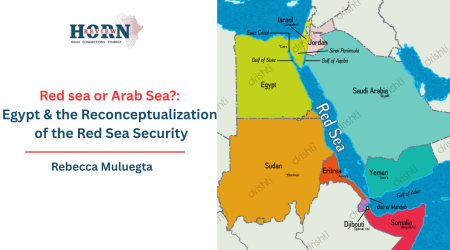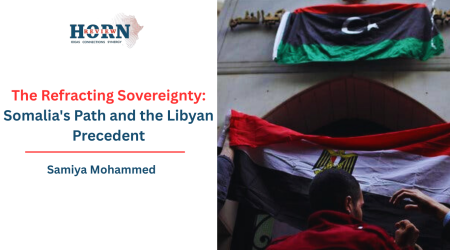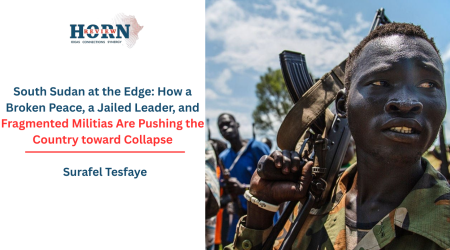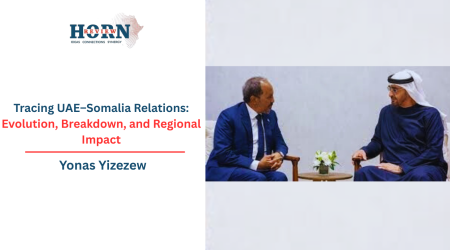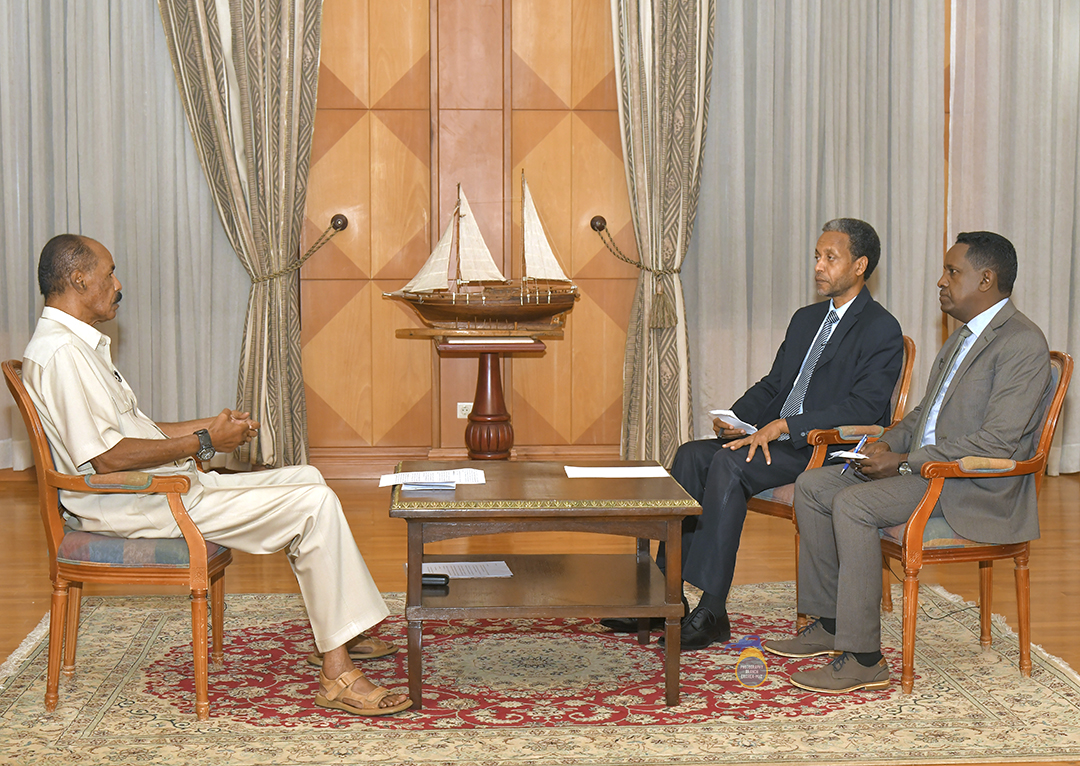
25
Jul
Asmara’s Echo Chamber: When Presidential Frustration Morphs into Diplomatic Folly
President Isaias Afwerki’s latest interview, delivered in character by the usual fire and brimstone, is a grim, even chilling, reminder of a single-obsession geopolitical preoccupation that has defined, indeed distorted, Eritrean foreign policy. For three decades, this enduring figure has dominated a country that craves stability and prosperity but whose public pronouncements always revert to an ethno-centrist discourse fixated on Ethiopia, traditionally portraying it as an “avitum” warring nation, a former pretender to Eritrean identity and not a sovereign neighbor with a right to its own worthy ambition. This persistent, quasi-relentless, obsession with Ethiopia, particularly at its own moments of utmost weakness, is evidence of a deep-seated frustration that appears to have been carefully stage-managed by President Isaias and which tells underlying emotional currents that too frequently overrule rational diplomatic practice.
President Isaias’s latest public appearance was a masterclass in emotional projection, a show in which an evident, near-frantic, irritation preceded every word. He spent an unprecedented amount of time in his address examining Ethiopia’s internal affairs, condemning its government, and even descending into the personal sphere of insult against its leaders. This is not the stately, measured tone one normally expects in a head of state; instead, it revealed a man whose temper frequently snapped under the pressure of his own perceived grievances. This persistent fixation to hold Ethiopia responsible for the every shortcoming of Eritrea after thirty years in office is a remarkable quirk. A national leader would reasonably be able to expect to announce concrete plans for his country’s advancement, but President Isaias consistently attribute Eritrea’s stunted growth to outside actors in the guise of Ethiopian machinations or alleged failures.
The most confounding question that arises is the very genesis of this unyielding preoccupation. Ethiopia, under Prime Minister Abiy Ahmed, extended a genuine olive branch in 2018, which resulted in the lifting of sanctions that had long encumbered Eritrea. This was one of profound diplomatic breakthroughs, and it gave Eritrea a clear path to re-engagement with the rest of the world and an opportunity to turn its own developmental gaze inwards. But instead of seizing this new freedom to chart a productive future, President Isaias’s phrases typically threaten a quick return to the cut-off imposed by this rapprochement and refer to some purer, perhaps unrealized, “romantic feeling” for a certain kind of relationship with Ethiopia one which likely only exists in his own emotional or strategic schema. His public behavior, tending to be on the verge of weeping or near hysteria whenever Ethiopia is mentioned, testifies to an emotional attachment that is deeply atypical for a state leader who is talking about Ethiopia. His extraordinary, almost visceral, concern with the affairs of Ethiopia, especially at times of its greatest crises, is a strange occurrence that assuredly influences Eritrea’s foreign policy and by extension, its internal realities.
The distinctive feature of Eritrean foreign policy under President Isaias’s leadership has been its raw lack of diplomatic flair, experience, or art. For over three decades, the Eritrean government has struggled with articulating its grievances in conventional diplomatic terms, repeatedly choosing instead to conduct them in public denunciation and unprovoked insults. Such a tactic put strain, not just on relations with Ethiopia, but has also influenced Eritrea’s relationship with other major players on the international scene, including the UAE and, from time to time, even the United States. His selective outrage in criticizing the US, whilst at the same time attributing Eritrea’s challenges in US relations (e.g., visa bans) to alleged Ethiopian “lobbyists,” represents a classic example of a cognitive dissonance that shifts blame from deficits in internal governance to external scapegoats. This constant refrain, designed to distance Eritrea from blame by making its failures the result of external factors, has the effect of twisting the nuances of international diplomacy. It is exquisite hypocrisy for a leader to strive for a “new era” of relations with a world power while blaming an adjacent country for the failure of their bi-lateral relations.
President Isaias’s recent interview, during which he “slammed” and “blasted” the Ethiopian government, reportedly “run by” UAE ruler Mohammed bin Zayed, was a step too far from firm diplomacy to outright personal attack. Such pronouncements are not merely undiplomatic; they reflect a frustrating presidential composition that prioritizes emotional release over strategic calculus. His assertions that Ethiopia’s 2018 reforms “went wrong” and “Collapsed,” and caused internal conflict, and that Ethiopia is “exporting the problem” by “beating war drums” against Eritrea to “cover up” its domestic problems further illustrate a pattern of other-blame for assumed failure.
The disdainful manner in which he mocked Ethiopia’s missive to the UN as “childish” and its aspirations for sea access as “very childish” is a stunning exhibition of disrespect for diplomatic norms and an unsettling habit of infantilizing legitimate national interests. Affective outbursts, devoid of the depth and self-control that is usually demanded in international discourse, demonstrate a leadership style driven by internal anxieties rather than pragmatic engagement.
The perpetual narrative of an external threat, specifically personified by Ethiopia, serves to divert attention from Eritrea’s pressing internal issues. Eritreans , under an impenetrable dictatorship, are continually shocked by their leader’s words, which rarely articulate a vision for domestic progress but consistently rail against a perceived external antagonist. This chronic externalization of problems, along with the apparent emotional tantrum fix-it behavior evident in his interview, suggests a profound need for a diplomatic change that extends beyond mere policy adjustments. It suggests a deep psychological or strategic paradigm that must be reconsidered. The various personas he assumes in his speeches, from feigned concern to outright contempt, also highlight one whose public persona hangs on the rolls of his mood, rather than on one that is consistent and diplomatic.
Given the gravity of the situation and the likelihood that these tensions will destabilize a fragile region, international intervention and de-escalation is absolutely necessary. The present dynamics, characterized by belligerent posturing and coded threats, are intolerable risks both for the two nations and the broader Horn. International opinion must move beyond expressions of dismay and take concrete action toward a more constructive conversation.This entails:A concerted diplomatic effort, led by regional and global players, to de-escalate the rhetoric and open doors for sincere dialogue between Addis Ababa and Asmara. This should include direct senior-level mediation that has the ability to address underlying issues without resorting to public condemnation.
There needs to be a shift towards seeking out common interests and taking benefit of the same, economic, regional security or environmental, to create a shared interest in stability. Moreover, there is a strong necessity for the international community to remind the Eritrean authorities of the importance of respecting norms of diplomatic practice and to engage in a cautious, reasonable dialogue. This is not a question of manners, but of the underlying order of international relations. The long-term security of the Horn is contingent upon such leaders that can separate legitimate national interests from personal grievances, and are able to convert those interests into a foreign policy of dialogue and cooperation, and not perpetual enmity. The time for allowing an individual’s personal frustrations to dictate regional peace needs to come to an end.
By Bethelhem Fikru,Researcher,Horn Review




